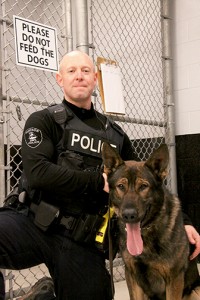Windsor Police introduce new dog officer

Windsor, ON – Constable Kris Lauzon introduces his new dog partner and member of the Windsor Police Services K-9 Unit, Fuse, at the department’s training facility. Photo by: Todd Shearon
Windsor Police Service recently introduced a new dog officer to their K-9 Unit.
Fuse, a two-year-old German Shepherd, and partner Constable Kris Lauzon recently completed training and are now on duty.
Lauzon, is no stranger to the intense 17-week preliminary training involved with a new dog. Lauzon had a five-year partnership with dog officer Aron, who is now retired.
“Officers train on a daily basis so both they and their dogs are experts in their field,” said Lauzon. “It’s like a pro athlete continuously honing their skills with constant repetition so things happen naturally.”
The officers develop strong bonds with their dogs, working 10 to 12 hours a day and living in the same house during their partnership. Most officers choose to have their dog continue to live with them after its retirement.
“We essentially spend 24 hours a day with our dogs,” said Rob Wilson, 44, senior constable and team leader of the Windsor Police Dog Unit. “At the end of our shifts they come home with us.”
Windsor currently has two Belgian Malinois and three German Shepherds in the unit. They are all dual-purpose trained in tracking, human scent, open and evidence searches.
Fuse is one of two Windsor dogs trained in narcotics, firearm and ammunition detection, including explosives.
“If something does happen (with explosives), it’s probably going to have mass casualties,” said Lauzon. “I wouldn’t say I have a fear of the explosives, but I do know there’s no room for me to take anything lightly.”
According to Wilson, Windsor selects and imports dogs from breeding facilities in Hungary, Germany and the Czech Republic. The dogs are sought out based on their agility, adaptability and intelligence and arrive completely untrained.
Wilson, who keeps track of the dog unit statistics, notes in 2016 they attended 2078 calls resulting in 65 dog arrests and 24 other arrests, which is why the unit is always looking for the “Michael Jordan of dogs.”
K-9 officers need to have complete faith in their partners, putting their own lives in the hands of the dogs.
“If you miss an explosive, that could be a terrible day for our community,” said Lauzon. “I try to let the dog work out in front of me and be able to do his job and utilize his nose to provide the detection.”
Spending as much time with the dogs as they do, many officers form emotional attachments with their canine sidekicks during their partnership.
“It’s no different than working with a person,” said social worker John Recine. “When you spend a lot of time with somebody you develop a relationship and a bond. You learn to work together and trust each other’s skills in whatever the job is. Working so closely together every day for over five years it only makes sense to have an emotional attachment to your partner.”
Wilson agrees that trust is vital to the success of a K-9 officer and their dog, “We’re a team. (My dog) Vegas trusts me and I trust him with his abilities and I know his limits.”


